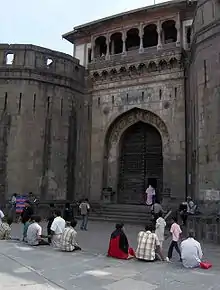Savitribai Phule Pune University
Savitribai Phule Pune University (SPPU), formerly University of Pune and University of Poona, is a collegiate public state university located in Pune, Maharashtra. Established in 1949, and spread over a 411 acres (1.66 km2) campus,[3] the university is home to 43 academic departments. The university is named after Savitribai Phule, a 19th-century Indian social reformer who is known for her contribution towards empowerment and emancipation of women through education. The university has affiliated colleges, departments, and research institutes, which are primarily in Pune, Ahmednagar and Nashik Districts.
Sāvitrībāī Phule Puṇe Vidyāpīṭh | |
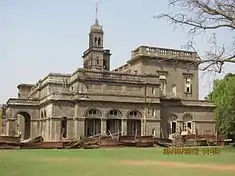 | |
Former names |
|
|---|---|
| Motto | Yaḥ kriyāvān saḥ paṇḍitaḥ (Sanskrit) |
Motto in English | "Where Actions Prove Knowledge"[1] |
| Type | Public |
| Established | 10 February 1949 |
| Chancellor | Governor of Maharashtra |
| Vice-Chancellor | Nitin R. Karmalkar |
| Students | 7,562[2] |
| Postgraduates | 6,948[2] |
| Location | , , 18.5523°N 73.8246°E |
| Campus | Urban |
| Affiliations | UGC |
| Website | www |
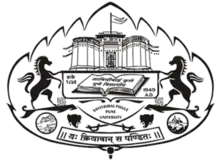 | |
In 2018, the University of Pune was ranked 7th among universities in India by the Times Higher Education.[4]
History
University of Pune was established on 10 February 1949 under the Pune University Act, passed by the Bombay legislature in 1948.[5] M. R. Jayakar became its first Vice-Chancellor. Its first office was started from the Nizam Guest House, which is part of Bhandarkar Oriental Research Institute on Law College Road. The university was operated at Nizam Guest House till 1 June 1949. Its current building originally called the Governor House. As its name suggests, it was the seasonal retreat of the Governor of Bombay.[6]
B. G. Kher, Chief Minister and Education Minister of the government of Bombay, helped ensure the university received a large allocation of land for their campus. The university was allocated over 411 acres (1.66 km2).[5]
Its location has historical significance. Some incidents of the Battle of Khirkee, during the Third Anglo-Maratha War, took place where the university is located.
The institution's name was changed from the University of Pune to Savitribai Phule Pune University on 9 August 2014 in honor of Savitribai Phule, the 19th century Indian social reformer who played an important role in improving the lives of women and the Dalit communities in Maharashtra during British colonial rule. She and her husband Mahatma Jyotirao Phule founded India's first native-run school for girls in 1848.[7]
Organisation and administration
Jurisdiction
Initially the university had a jurisdiction extending over 12 districts of western Maharashtra. With the establishment of Shivaji University in Kolhapur in 1962, the jurisdiction was restricted to five districts: Pune, Ahmednagar, Nashik, Dhule and Jalgaon. Out of these, two districts—Dhule and Jalgaon—are attached to the North Maharashtra University in Jalgaon established in August 1990.[5]
Vice-Chancellors
Past and present vice-chancellors of the university are:[8]
- Mukund Ramrao Jayakar (1948–56)
- R. P. Paranjpye (1956–1959)
- Dattatreya Gopal Karve (1959–61)
- Datto Vaman Potdar (1961–1964)
- Narahar Vishnu Gadgil (1964–1966)
- Dhananjay Ramchandra Gadgil (1966–1967)
- Hari Vinayak Pataskar (1967–1970)
- B. P. Apte (1970–72)
- G. S. Mahajan (1972–1975)
- Devdatta Dabholkar (1975–1978)
- Ram G. Takwale (1978–1984)
- V. G. Bhide (1984–1988)
- S. C. Gupta (1988–1995)
- Vasant Gowariker (1995–1998)
- Prof. Arun Nigavekar (1998–2000)
- N. J. Sonawane (2000–2001)
- Ashok S. Kolaskar (2001–2006)
- Ratnakar Gaikwad (2006–2006)
- Narendra Jadhav (2006–2009)
- Dr.Arun Adsool (2009–2010)
- R. K. Shevgaonkar (2010–2011)
- Sanjay Chahande (2011–2012)
- Wasudeo Gade (2012–2017)
- Nitin R. Karmalkar (2017 onwards)
Affiliations
In 1949, there were 18 affiliated colleges (including colleges such as the Fergusson College, Sir Parashurambhau College, Nowrosjee Wadia College and College of Engineering, Pune) with an enrolment of over 8000. Thereafter, the number of colleges increased. As of 2017 the university had 43 departments,[9] 433 affiliated colleges and 232 recognized research institutions, with an enrollment of 496,531 students for undergraduate and graduate courses.[10]
Departments
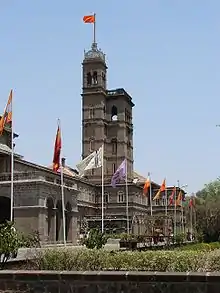
The university has departments and centres, offering courses in science, social science, management, law, etc.[9]
- Department of Anthropology
- The Department of Law was established in 1965 under the stewardship of Professor Dr. S.K.Agrawal a legal scholar.
- The Department of Zoology was one of the first to be established by the Savitribai Phule Pune University in 1950. It offers a postgraduate programme (MSc, M. Phil and PhD) in Zoology.
- The Department of Media and Communication Studies (DMCS); was established in 1990. It offers a two-year (interdisciplinary) full-time master's course in Media and Communication Studies (MSc). This master's course in the second year offers two specializations, Media Research and Video Production. DMCS also offers M.Phil and PhD. in Media and Communication Studies.
- The Department of Geography was established in 1950. Every year the department admits students for its M.A/MSc., M.Phil and PhD courses. The department also offers students a course in Remote Sensing and Geospatial Information Systems (GIS and RS).
- Department of Geo-science
- The Institute of Bioinformatics and Biotechnology is an autonomous institute with an affiliation to the Savitribai Phule Pune University. It was established with a view to promote research and development activities in bioinformatics and biotechnology.
- The Department of Chemistry was one of the earliest established by the university. It has received the CAS status (Centre for Advanced Studies in Chemistry). Its research programs cover areas like computational chemistry, organic chemistry and inorganic chemistry and biochemistry. The department has a collaboration with the National Chemical Laboratory (NCL), a research institute in India. It has a separate central computer laboratory for students.
- The Department of Microbiology, University of Pune was established in 1977. It is an autonomous department and offers a credit based course in Microbiology which covers topics in Immunology, Medical Microbiology, Molecular Biology, Industrial Microbiology and Biochemistry.
- The Department of Materials Science.
- The Department of Management Sciences (PUMBA) is a business school run by the university. It was formed in 1971 and has about 360 students. In 2007–08, it started an MBA++ course. It also offers an MBA with a biotechnology specialisation.
- Department of Biotechnology: In 1985, the National Board of Biotechnology selected the Savitribai Phule Pune University as one of its five centres for imparting training in MSc Biotechnology.
- The Department of Environmental Science was established as an interdisciplinary school in 1978.
- Unipune introduces a bachelor's degree course in Environment Science. The course started from the academic year of 2018–2019.[11]
- Department of Education was established in 1990 with aims as research and higher learning center in area of Education and Educational Sciences special learning on Teacher Education.
- Computer Science Department (PUCSD): In 1980, a one-year programme was started towards the BSc (Applied) degree in Computer Science. The M.C.A. programme was launched in 1983, the MTech degree programme in 1985, and the one-year BSc (Applied) programme was upgraded to a two-year MSc in Computer Science in 1986.
- Department of Psychology, Savitribai Phule Pune University, was established in May 1950
- The Department of Physics started in 1952. Its research programmes cover areas like Materials Science, Solid State Physics, Condensed Matter Physics, Nonlinear Dynamics, Scanning Tunneling Microscopy, Cloud Physics, Thin/Thick Films, Diamond C.oatings, Nuclear and Accelerator Physics, Lasers, Plasma Physics, Field Electron/Ion Microscopy, Biophysics etc. The department has received funds from DST / government of India under the FIST program.
- The Department of Atmospheric and Space Sciences offers a postgraduate programme (MSc, MTech and PhD) in Atmospheric Science which is jointly conducted by Indian Institute of Tropical Meteorology (IITM), Pune and the Department.
- The Department of Electronic Science started in 1984. Its labs and research programmes include System Design, Cyber lab for Electronics, Sensors, Materials, MEMS, Embedded systems, Optoelectronics, Virtual Instrumentation. Every year 30 students are taken in for post graduation studies through an entrance exam.
- Department of Ecotechnology
- The Department of Instrumentation Science (USIC) is a spin-off from the university workshop. The department was conceived as an extension of the physics department to build and maintain instruments used by the Physics department and served as a prototyping laboratory for building and testing new instruments. Initially the department started running an MSc program for Applied Electronics autonomously, funded in large part by student fees and research projects. To provide a broader focus, the MSc Applied Electronics course gradually metamorphosed into the MSc Instrumentation Science Course with additional focus on sensors and transducers, as well as product design. In addition to the MSc course, the department features a sensor lab which continues to collaborate with the Physics and Electronics departments providing PhD candidates an inter-disciplinary environment to pursue independent research work.
- The Centre for Modeling and Simulation (CMS) is an autonomous centre at the university. It was established in 2003.
- Interdisciplinary School of Scientific Computing (ISSC)
- Department of Linguistics
- The Department of Statistics was established in 1953. The department was in the main building of the university. Prof. V. S. Huzurbazar was its first head. In 1962 the department was shifted to its new building later named as 'Wrangler Paranjapye Ganit ani Sankhyashastra Bhavan'. The Department of Statistics was separated in 1976. Now the department is recognised as the 'Centre for Advanced Studies in Statistics'.
- Department of Sociology
- Department of Mathematics
- Department of Politics and Public Administration
- The Department of Economics offers a Master's programme in Economics and a doctoral programme. The department has a post-graduate diploma in Foreign Trade.
- Department of Architecture
- Department of Defence & Strategic Studies
- Department of Urban Studies & Planning
- Centre for Innovation, Incubation & Enterprise
- The Department of Foreign Languages was started in Ranade institute building in 1949. It offers courses for German, French, Russian, Japanese and Spanish languages from elementary level to post graduation courses. Batches are conducted in morning as well as in evening. Over 1500 students are enrolled every year.[12]
- The Department of Technology provides a research platform for solving industry relevant research problems. It runs industry-university sponsored MTech-PhD integrated programs. Four technology boards have been established under the umbrella of 'Faculty of Technology'.
- Competition Exam Center (CEC): is for coaching programs for various government competition exams.[13]
- Krantijyoti Savitribai Phule Women's Studies Centre.[14]
- Skill Development Centre: Established in 2014, the department is credited to facilitate 4 credit skill development course for all PG students. The department also runs 5 B.Voc (Bachelor of Vocation) Courses, namely Automotive Automation, Renewable Energy, Retail Management, IT & ITeS, Jewellery Designing and Gemology.
- Information Technology(IT) Cell: IT cell has been established in 2013 under the leadership of IT Manager to integrate and consolidate all IT automation projects like Academic functions Affiliation, Eligibility; Examination functions - Forms, certificates;Finance function - online payments; Admin functions - Recruitment, eSeva book in University. University has received Maharsahtra State eGovernance Silver award.
Academics
Knowledge Resource Center (Jaykar Library)Savitribai Phule Pune University
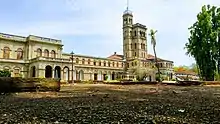
The library was founded in 1950 and is a center of reference and information. It subscribes to Indian and foreign research journals, and receives periodicals on a gratis and exchange basis. It has more than 450,000 books and journals. An inter-library loan facility is extended to colleges, institutions and government agencies. The Jayakar Library has preserved ancient Indian texts in the form of manuscripts and books. It has computerized all library activities and using RFID technology and has undertaken a project in digital library management.
Rankings
| University rankings | |
|---|---|
| General – international | |
| QS (World) (2021)[15] | 651-700 |
| QS (Asia) (2020)[16] | 191 |
| QS (BRICS) (2019)[17] | 100 |
| Times (World) (2020)[18] | 601-800 |
| Times (Asia) (2020)[19] | 135 |
| Times (Emerging) (2020)[20] | 128 |
| General – India | |
| NIRF (Overall) (2020)[21] | 19 |
| NIRF (Universities) (2020)[22] | 09 |
| The Week (Universities) (2019)[23] | 8 |
| Outlook India (Universities) (2020)[24] | 9 |
Savitribai Phule Pune University was ranked 601–800 in the world by the Times Higher Education World University Rankings of 2020,[18] as well as 135 in Asia[19] and 128 among Emerging Economies University Rankings in 2020.[20] The QS World University Rankings of 2020 ranked it 191 in Asia in 2020[16] and 100 among universities in BRICS nations in 2019.[17]
It was ranked 19 in India overall by the National Institutional Ranking Framework in 2020[21] and 9th among universities.[22]
Achievements
In the Khelo India University Games in Odisha, Savitribai Phule Pune University was on top with 29 medals including fifteen gold, eight silver and six bronze medals on the fifth day on 26 February 2020.[25]
Savitribai Phule Pune University's Joyita Sarkar was one of the 21 people and the only one from an educational institute in the state to be awarded by President Ramnath Kovind for her role in science communication and popularisation on the National Science Day in New Delhi.[26]
Four students from the Savitribai Phule Pune University's (SPPU) competitive exams centre have stood first in the state in their respective categories for Maharashtra Public Service Commission (MPSC) civil services exams for sales tax inspector.[27]
Research
More than 70 research institutions have been recognised by the Savitribai Phule Pune University for research. These include institutions of national importance like the Inter-University Centre for Astronomy and Astrophysics (IUCAA), Indian Institute of Tropical Meteorology(IITM), National Chemical Laboratory (NCL), National Centre For Cell Science (NCCS), National Institute of Virology (NIV), Gokhale Institute of Politics and Economics (GIPE), Documentation Research and Training Centre (DRTC) of the Indian Statistical Institute (ISI), Centre for Materials for Electronics Technology (C-MET) among others.
Other research organisations which are associated with the university are:
- National Centre for Radio Astrophysics (runs the Giant Metrewave Radio Telescope)
- Centre for Development of Advanced Computing (home to the PARAM range of supercomputers)
- Institute of Bioinformatics and Biotechnology (IBB)
- Shreemati Nathibai Damodar Thackersey Women's University (SNDT Women's University)
Student life
Student halls of residence
The colleges of the university provide residences for students. The International Centre provides residences for international students, including visiting students.[28]
Notable alumni and faculty
Notable alumni of Savitribai Phule Pune University include major politicians of India including Vishwanath Pratap Singh, 7th Prime Minister of India; Pratibha Patil, 12th President of India; Vilasrao Deshmukh, 17th and 19th Chief Minister of Maharashtra; and Sharad Pawar, former Chief Minister of Maharashtra. P.V. Narasimha Rao, 9th Prime Minister of India, graduated from Fergusson College, when the college was under the University of Mumbai.
Khaled Bahah, 2nd Vice President of Yemen and Prime Minister of Yemen, received his BCom and MCom from the university.[29]
In science and engineering, notable alumni of the university include Padmanabhan Balaram, chemist and director of the Indian Institute of Science; Kantilal Mardia, statistician and Guy Medallists; Thomas Kailath, electrical engineer and recipient of the 2014 National Medal of Science; Vistasp Karbhari, civil engineer and the eighth president of the University of Texas at Arlington;[30] Suhas Patankar, professor at the University of Minnesota, and pioneer in the field of computational fluid dynamics (CFD) and finite volume method; C. Kumar N. Patel, inventor of the carbon dioxide laser, recipient of the 1996 National Medal of Science and vice-Chancellor for Research at the University of California, Los Angeles;[31] and Vinod Scaria, bioinformatician, who is known for sequencing the first Indian genome. V. S. Huzurbazar served as the first head of the statistics department. S.N. Sadasivan who was Civil Services trainer, Author and historian.
Other alumni include Ashutosh Agashe, businessman-cricketer, Bollywood actor Kay Kay Menon, Politician K. T. Rama Rao,[32] Gulshan Kumar Bajwa, Social activist against corruption, and Pushkar Mukewar,[33] Entrepreneur, & Co-Founder of Drip Capital.
See also
- University of Pune faculty
- List of universities in India
- Universities and colleges in India
References
- "Motto in English – Pune University Emblem Details". University of Pune. Retrieved 22 July 2011.
- "University Student Enrollment Details". ugc.ac.in. Retrieved 10 February 2020.
- "The University of Pune Campus". University of Pune. 2010. Archived from the original on 29 August 2011. Retrieved 29 September 2011.
- "Best universities in India 2018". Retrieved 13 September 2018.
- "Pune University History". Pune University. Retrieved 21 September 2013.
- "University of Pune turns 65 : Nizam Guest House to Oxford of the East". 10 February 2014. Retrieved 20 May 2018.
- "It's Savitribai Phule Pune University". The Times of India. Retrieved 7 August 2014.
- "Vice-Chancellors List". Retrieved 20 August 2018.
- "Departments List". Pune University. Retrieved 22 September 2013.
- "List of Affiliated Colleges and Institutions". Times Higher Education. Retrieved 22 September 2013.
- "Unipune introduces a Bachelor's degree course in Environment Science". collegesearch.in. Retrieved 11 October 2018.
- "Department of Foreign Language : Savitribai Phule Pune University". unipune.ac.in. Retrieved 20 May 2018.
- "Used Mobile Concrete Crusher,Used Mobile Jaw Crusher". cecunipune.in. Retrieved 20 May 2018.
- "Department of Women's Studies Centre : Savitribai Phule Pune University". unipune.ac.in. Retrieved 25 February 2017.
- "QS World University Rankings 2021". QS Quacquarelli Symonds Limited. 2020. Retrieved 10 June 2020.
- "QS Asia University Rankings 2020". QS Quacquarelli Symonds Limited. 2020.
- "QS BRICS University Rankings 2019". QS Quacquarelli Symonds Limited. 2018.
- "Top 1000 World University Rankings 2020". Times Higher Education. 2019.
- "Times Higher Education Asia University Rankings (2020)". Times Higher Education. 2020. Retrieved 4 June 2020.
- "Times Higher Education Emerging Economies University Rankings (2020)". Times Higher Education. 2020. Retrieved 13 March 2020.
- "National Institutional Ranking Framework 2020 (Overall)". National Institutional Ranking Framework. Ministry of Education. 11 June 2020.
- "National Institutional Ranking Framework 2020 (Universities)". National Institutional Ranking Framework. Ministry of Education. 11 June 2020.
- "The Week India University Rankings 2019". The Week. 18 May 2019. Retrieved 9 June 2020.
- "Top 75 Universities In India In 2020". The Outlook. 8 October 2020. Retrieved 8 October 2020.
- "With 29 medals in its kitty, Savitribai Phule Pune University sits comfortably on top". The Indian Express. 29 February 2020. Retrieved 9 March 2020.
- 29 Feb, Ardhra Nair | TNN |; 2020; Ist, 04:44. "SPPU student gets award for animal-free pharma test story | Pune News - Times of India". The Times of India. Retrieved 9 March 2020.CS1 maint: numeric names: authors list (link)
- "Four Savitribai Phule Pune University students top MPSC sales tax inspector exam". Hindustan Times. 31 December 2020. Retrieved 9 March 2020.
- "Facilities". Pune University. Archived from the original on 22 September 2013. Retrieved 21 September 2013.
- "New Permanent Representative of Yemen Presents Credentials". United Nations. 13 August 2014. Retrieved 8 August 2015.
- "Vistasp Karbhari takes helm as eighth president of The University of Texas at Arlington" (Press release). PR Newswire. 1 June 2013. Retrieved 21 September 2013.
- "C. Kumar N. Patel". The American Institute of Physics. Archived from the original on 22 September 2013. Retrieved 21 September 2013.
- "THE COMPLETE MAN - Kalvakuntla Taraka Rama Rao aka KTR". Ritz Magazine. 8 July 2015. Retrieved 25 March 2018.
- "Pushkar Mukewar, Co-founder & Co-CEO". Crunchbase.
External links
| Wikimedia Commons has media related to University of Pune. |
